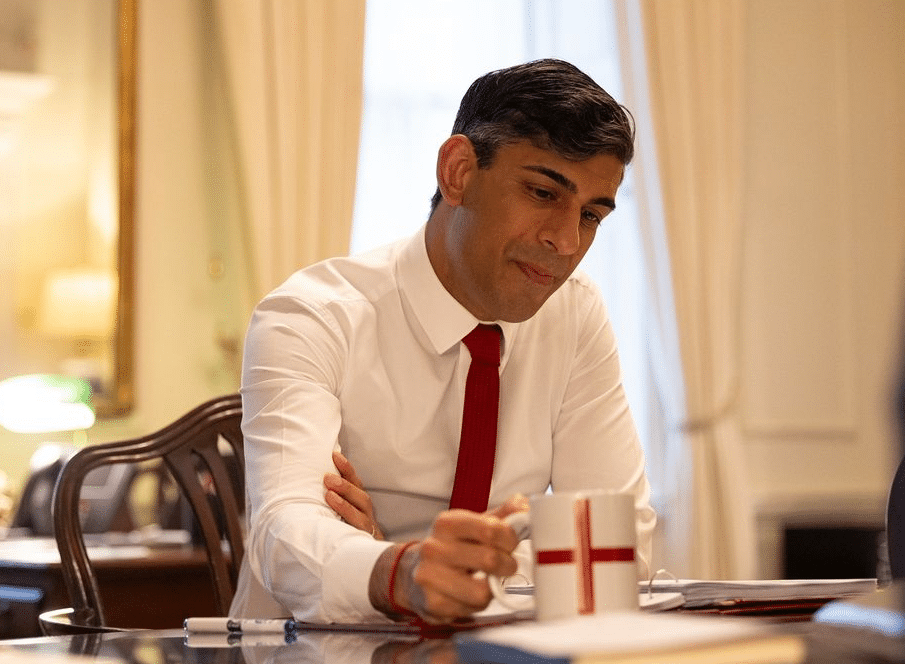Mental health shouldn’t be a political issue. But it is.
Mental Health
Mental health is being dragged into the culture wars by Rishi Sunak - but shouldn't mental health help be apolitical?
Mental health shouldn’t be a political issue, it is a health issue.
When Rishi Sunak bemoaned a “sicknote culture” in a speech a few days ago, saying there was a need to “be more honest about the risk of over-medicalising the everyday challenges and worries of life,” and announcing he would be appointing “health and work professionals” to assess workers rather than GPs. How that will practically play out is unclear, but there is the implication these will be patrician figures who will give you a look up and down and decide for themselves whether you’re well or not; a sort of mental health Gestapo.
Sunak clearly is getting into election mode in turning mental health into something that only ‘wokies’ care about, and suggesting that people on long term illness are workshy rather than genuinely sick, Rishi Sunak is trying to turn mental health into an Us and Them situation. As in, wussy lefties weep about mental health while gutsy right wingers get on with it and work. But, of course, mental health can affect anyone, regardless of their political persuasion, and surely provisions to help people with mental health issues should be there for everyone, just as with a physical injury.
To make mental health into a left vs right thing is disingenuous and outright dangerous – it’s political opportunism, looking to score points with a certain factions of party members and voters and media, by using their favourite trigger word ‘woke’. But mental health goes beyond woke, it’s an issue that crushes everyone at one time or another. It doesn’t matter if you’re a far righter or a communist, you will be affected by mental health as much as the vast mass in the middle – and actually deserve help with it, much in the same way everyone in society should receive cancer treatment.
Now, don’t get me wrong, politics does have a part to play in mental health. Obviously. Politics involves politicians making decisions about how to run the country, which directly affects the lives of the people in it. There is a direct correlation between poverty and poor mental health; you will find the highest drug death and suicide rates in poor regions where jobs are difficult to find. The Office of National Statistics had the last recorded suicide rate in the North East in 2022 was 12.8 deaths per 1000, compared to 7 deaths per 1000 in London and a 10.7 average in England and Wales.
And it’s no great surprise that demand for mental health services and the number of workers reporting work-related stress, depression and anxiety has soared since the pandemic. It’s not simply skiving workers enjoying life at home, its people dealing with a downturn in quality of life: the cost of living crises, job loss, debt, and a lack of hope about the future. These things, as we have seen, can be the result of political decisions. Even Tories can’t argue that Liz Truss’ bizarre and disastrous 41 days as PM resulted in a catastrophic mortgage rate hike that plunged many families into hell.
The lack of mental health service funding has compounded this, and in many ways Rishi Sunak’s suggestion that people are workshy is the ultimate hollow joke: cast into disillusionment by his administration, unable to find support which his administration has also cut…but the administration says its our fault
The truth is that mental health should be treated respectfully and seriously by whichever political party is in power. Instead it is continually made into policy. And further puts up barriers for whole sectors of society: why should a right wing person in need feel unable to seek help because it would be against his politics. Would he refuse a blood transfusion after a work injury because it’s a bit left?
Unfortunately its limited to politics, a reductive approach that is trite and costs lives. Where are the brave right wing leaders who will speak up for it? Can we rely upon a Labour party to take meaningful measures when they are elected? All parties must stand up for mental health.
By way of illustrating this issue further, here are some of the responses to Sunak’s speech from mental health experts, which show exactly why his approach is misguided…
Mark Winstanley, Chief Executive of Rethink Mental Illness, said:
“Our social security system, like the NHS, exists to support us and our loved ones when we’re in need. We agree that people who have experienced mental illness need more support to enter the world of work when they’re well enough to do so, and we welcome the government’s attention on this issue. But we need to hear solid details from the government on how this support will be funded, delivered and co-produced with the people it aims to help, and there is also the question of how we can put the nation’s wellbeing back on a stable footing while mental health services are so under-resourced. At the same time, we must be careful that we do not inadvertently stigmatise those who are too unwell to work. Just as pressing as the need to help people into work is the need to build a social security system which safely supports people, given the ongoing harm caused by the DWP’s punitive approach.”
Dr Sarah Hughes, CEO of Mind, said:
“We are deeply disappointed that the Prime Minister’s speech today continues a trend in recent rhetoric which conjures up the image of a “mental health culture” that has “gone too far”. This is harmful, inaccurate and contrary to the reality for people up and down the country. The truth is that mental health services are at breaking point following years of under investment with many people getting increasingly unwell while they wait to receive support. Indeed the Care Quality Commission’s latest figures on community mental health services show that nearly half of people (44%) waiting for treatment found their mental health deteriorated in this time.
“To imply that it is easy both to be signed-off work and then to access benefits is deeply damaging. It is insulting to the 1.9 million people on a waiting list to get mental health support, and to the GPs whose expert judgement is being called into question.
“People need to be offered tailored support from mental health professionals if they are to return to work, not face threats of losing what little money they currently have to live on. The support just isn’t there. Demonising people for failures of the systems meant to support them is incredibly unhelpful and we urge the government to reassess its approach to this issue.”
And the Campaign Against Living Miserably had this to say:
Trending

Join The Book of Man
Sign up to our daily newsletters to join the frontline of the revolution in masculinity.

















